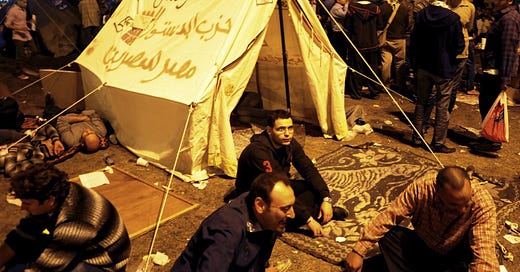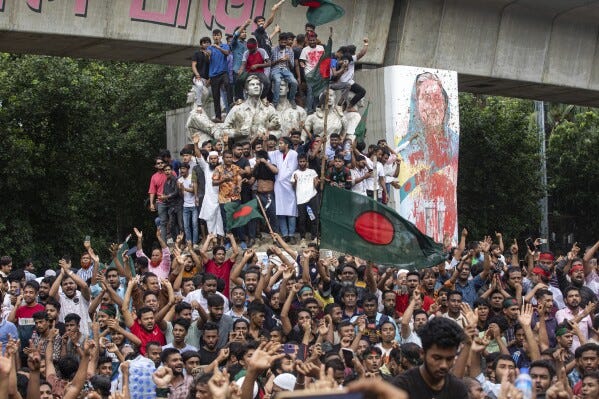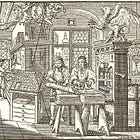Radical writing always reflects the time and place it was born in, but even in books written in other centuries or on other continents, we can identify with shared experiences, or learn more about our own situation by contrasting it with a different one… and sometimes both!
In the coming year, I want to launch a project to support radical translators, especially those in the Global South/ folks translating to and from non-European languages/ folks translating for and from movements in (post?) colonized countries.
Leave a comment to this newsletter if you want to recommend any anarchist or other anti-authoritarian texts you think would be useful in other languages, especially if you’re from a migrant background, or if you, your friends, or family live in a non-Euro/settler country.
So here are two polls on books to translate, and then a couple on which of my books you like the best.
The first question focuses on translations about historical uprisings and struggles. Notes about each choice appear below.
Louise Michel’s vital account of the Paris Commune of 1871, from the barricades to the school houses, from the field hospitals to the neighborhood committees, Michel was one of the most influential and inspiring participants in this rebellion, that showed the true nature of the State and also the incipient patterns of the authoritarian socialists who initially denounced it. The epilogue talks about exile in colonized Kanaky, the Kanak independence struggle, and how many socialist exiles participated in French colonialism.
As far as I know, this would need to be a research project and then a translation, unless an anarchist book already exists about the Shinmin Commune of Manchuria, 1929-1931, organized by the Korean Anarchist Federation in Manchuria, eventually crushed by the combined forces of Japanese imperialists, Chinese nationalists, and Chinese, Russian, and Korean communists. The experience is largely unknown even in Korea, as Korean nationalists ignored the anarchist organization and claimed anarchists who were too prominent to be erased from the history as nationalists and patriots (much like what Ukrainian nationalists did with Makhno).
As far as I know, only one part of Augustí Guillamón’s tetralogy on the CNT in the Spanish Civil War has been translated into English (by Paul Sharkey, and published by the Kate Sharpley Library/ AK Press). Guillamón is one of the foremost radical historians of the Spanish Civil War and his research has been critical to building up a deromanticized account of the power struggles in the CNT, how it was taken over by bureaucrats, and how the upper levels of the CNT joined the Socialists, Communists, Republicans, and left nationalists (under the watchword of “antifascist unity”) in leading the counterrevolution against the anarchist base, leaving that working class base with strategic questions about how to push the revolution forward, questions it was never able to answer.
Abel Paz, another of those I consider the four greatest historians on anticapitalist movements in the Spanish state (and all of them are from the Spanish state, and very few of their works have ever made it into English or other languages), wrote this largely forgotten but critical work, detailing how part of the anarchist movement reached out to the Moroccan independence movement at the start of their revolution in 1936, offering to fight together against Spanish and French colonialism. This offer of solidarity, however, was shot down by the Socialists, who wanted to retain France as an ally, and the Communists, who wanted to hem in the anarchists. Ironically, not only was this attempt absolutely the right thing to do, but though they did not know it at the time it was probably the only way the anticapitalists could have succeeded in their revolution. A forgotten history of how the Socialists and Communists once again chose power over anticapitalist and anticolonial revolution, even if it meant handing victory to the fascists.
Rubén Trejo wrote this useful book on the anarchist participation in the Mexican Revolution, particularly from 1910 to 1913. To be honest, the book left me wishing for more detail and more research, but it makes up for it as one of the few longer accounts of a crucial revolutionary movement. Anarchists were a key force in the beginning of the revolutionary movement in the north of México, succeeding in creating stateless self-organizing zones in much of the Baja Peninsula and winning some key military victories, but they failed to establish solid lines of communication with the Zapatistas (really their only possible allies in the conflict), they were shunned by much of anarchist movement internationally in part due to tragic problems of translation (many anarchists thought they were a political party), and they faced brutal repression by revolutionary and government factions as well as active attacks by the US government.
A book put out by the anarchist publisher Milvus in València, this 2019 book looks at the struggles of the Indigenous communities of Cherán, in Michoacán, México. They fought for their autonomy, traditional forms of self-organization, their food culture, and their relationship with the ecology. And they have had to fight with every weapon available to them against police, paramilitaries, and the criminal gangs (often connected to both continental narco-traffickers as well as legal logging companies) to protect their forests, their water, and their lives.
This book or video would combine translations from the documentary Precaristas and the book Armas de Barrio about the massive, combative, and radical lower class housing struggle sparked by the Federación Anarquista de Gran Canaria, Gran Canaria being the poorest part of the Spanish state and a colonized island off the northern coast of Africa. Their struggle has included communal squatted housing blocks, eviction defense, and mass rent strikes.
This project would require original research and interviews with anarchist and other comrades in Bangladesh, looking into the ongoing uprising against an autocratic government and how the movement adapts as the military and economic interests try to impose another government that will more effectively achieve the same aims as the old government.
Teia dos Povos is an anti-authoritarian, anticapitalist network of Indigenous, peasant, Afro-Brazilian, ex-urban, and landless communities across Brazil. They organize in a way that favors autonomy, solidarity, mutual aid, and direct action, influenced by Indigenous and anarchist methods. In turn, many communities and participants in the Teia dos Povos network have been a major influence on the anarchist movement in Brazil.
There may already be a book on Egypt’s Tahrir Square Uprising in Arabic, from a radical perspective. Otherwise, this would constitute a labor-intensive process of translating shorter texts and interviewing anarchists who were influential participants in the uprising, many of who have gone to prison or have since had to flee the country. Such projects can be crucial for strengthening networks amongst diasporic movements, enabling greater material solidarity, and also allowing people who went through the exhilaration and then trauma of rebellion and brutal repression to deal with the extreme emotions that have often pushed our elders in struggle into silence, depression, poor health, and even suicide.
So… after my last poll…
…a lot of people commented asking why I didn’t include any of my own books in the polls. I dunno, I don’t like competitive dynamics or the guilting that could come up (like, I don’t want fans or for people to think they need to drop me a compliment, I want to know what they actually think).
But anyway, here’s a poll of some of my own books, or ones I maybe had a hand in…
aaaaand:
Some of these might need a little explanation:
We Are an Image from the Future explores the anti-police, largely anarchist insurrection that spread all across Greece and beyond in 2008, using interviews, translations, and original texts.
“Fire Extinguishers and Fire Starters,” “The Rose of Fire Has Returned,” “After the Crest,” “From 15M to Podemos: The Regeneration of Spanish Democracy,” Four articles from 2011 to 2016 that explore important moments of revolutionary struggle in Barcelona: the 15M movement (a major influence on Occupy, but that grew much larger and in many places developed a great capacity for self-organization); the organizing that led to an insurrectionary general strike in 2011, breaking the hold of reformists and pacifiers; the difficulties of the anarchists in maintaining a clear view of our situation and keeping our hopes up during the inevitable downturns; how democracy manifested as a powerful institutional force in pacifying and repressing revolutionary movements.
“An Anarchist View of Early State Formation.” Specific histories and an analysis of patterns that provide an anarchist framework for understanding how and why states evolve, as well as how and why so many states have been overthrown by their subjects throughout history. More technical than most of my other books.
“Strategies for Ecological Revolution from Below.” Anticapitalist, anticolonial critiques of the official climate framework and the mainstream environmentalist movement, and interviews and portrayals of actually effective, actually realistic, radical ecological and anticolonial movements from all over the world.
Wait, you read this one already? Detritus Books only released it a few weeks ago! Or maybe you read the original in Catalan? Or you were a part of that reading group that read a pdf of an earlier draft. What did you think? Anyways, this essay consists of my sad and angry but also hopeful analysis of how the anarchist movement in Catalunya largely self-destructed. Since I’ve moved back to the States, I’ve found it applies pretty well here too, so I translated it…
I’m really curious how y’all answer! On the last poll, my choice was only the #1 choice one time! A lot of times my faves were closer to last, heheh.
And as always, please leave comments and I’ll do my best to answer (but after the 10th I’ll be off the radar for a while).
Get the books from this poll and the previous polls into your libraries, gift them to friends, help spread radical ideas!
And above all, take care of one another.








I'm translating La Commune into English! currently an unofficial project but planning to reach out to publishers once I have a solid draft + proposal.
Hello comrade,
We are activists from Brazil and would like to translate your book "The Solutions are already here".
In October 2025, our city will host COP30, and we want this to be an opportunity to demonstrate our rejection of the policies decided in our name and against us.
Your book, for this reason, would be an excellent argument to mobilize.
Let us know what you think.
Anarchist greetings
The CCLA team